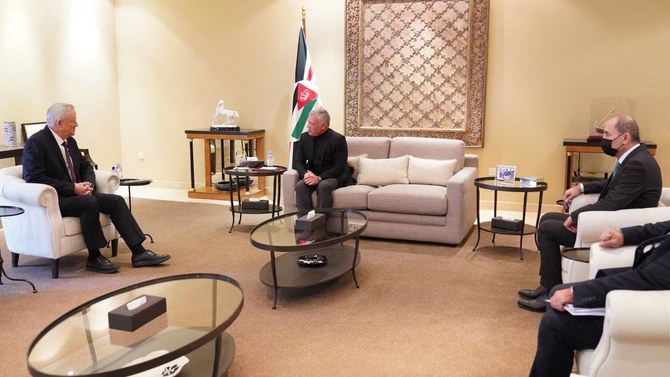AMMAN: Jordan’s King Abdullah has publicly hosted a senior Israeli official for the first time in more than four years.
Pictures released by the official Jordanian news agency Petra showed the monarch, Minister of Foreign Affairs Ayman Safadi, and the director of his office Jafar Hassan, with Israel’s Defense Minister Benny Gantz.
The meeting took place less than 24 hours after Israel defused a tense situation in the occupied Palestinian territories leading to the end of a 141-day hunger strike by Hisham Abu Hawash who was protesting his administrative detention by the Israelis.
Petra said that during talks, the king reiterated the need to maintain calm in the Palestinian territories, and to take the necessary measures toward achieving a just and comprehensive peace, based on the two-state solution.
Tagreed Odeh, a Jordanian analyst focused on the Palestinian issue, told Arab News that the visit would help “improve diplomatic relations” with Israel after years of Amman being sidelined during the administrations of former US President Donald Trump and ex-Israeli Prime Minister Benjamin Netanyahu.
The key for Jordan, Odeh said, was to find a way to “bring back all parties to the negotiating table for a peace based on the two-state solution which is what the king has repeatedly called for.”
Gantz pointed out the importance of relations with Jordan. “I thank His Majesty for keeping the stability in the region and the improvement of the relations between Israel and Jordan since the new government was formed in Israel,” he said.
Hazem Kawasmi, a Jerusalem-based Palestinian civil society activist, told Arab News: “The people of Gaza under siege are not going to accept any more ceasefires without the lifting of the siege.
“Palestinians in the West Bank are suffering from the increasing settler attacks, and everyone can see that there is no political horizon left for the two-state solution.”
Ofer Zalzberg, director of the Middle East program at the Herbert C. Kelman Institute, told Arab News: “(Gantz) is trying to frame himself through international engagement with Washington, Amman, and Ramallah as a new Yitzhak Rabin (former Israeli PM) — a war hero who ensures Israeli interests are served through foreign policy successes.”
On the policy issue, he said the meeting was “part of elevating a stabilization policy in the face of a weakened Palestinian Authority.”















